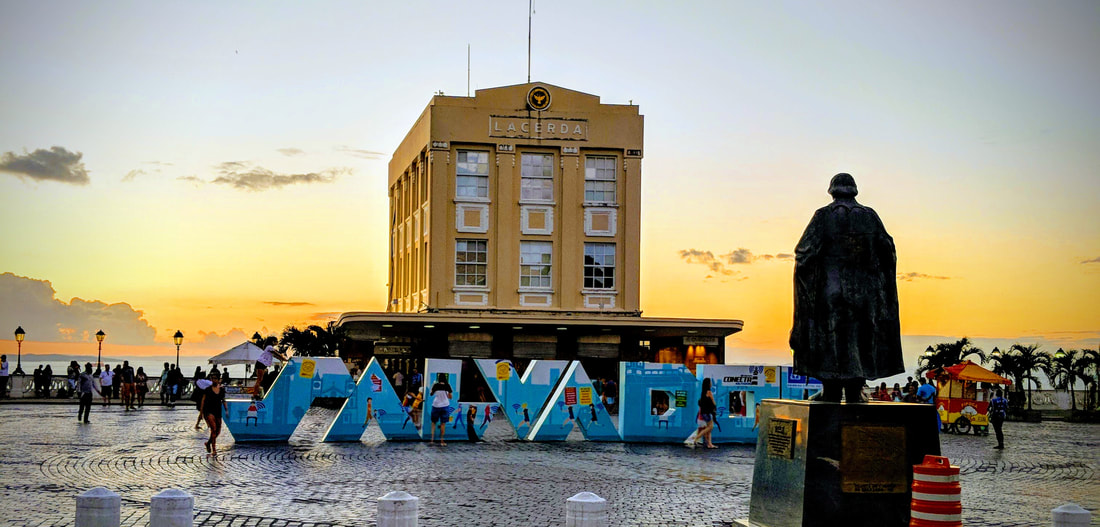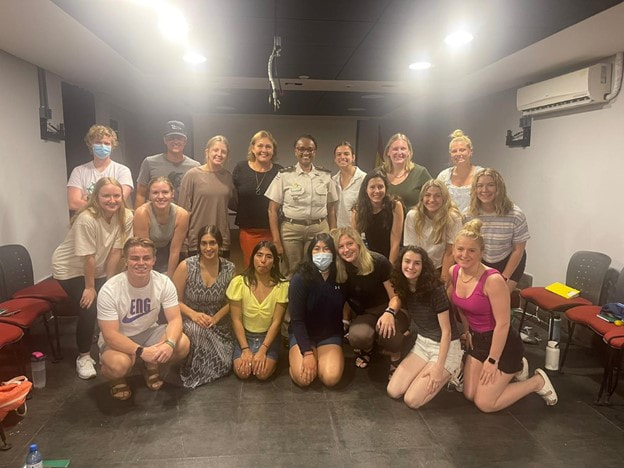|
By Brianna Kreft She joined the police force when she was eighteen years old. She founded a violence against women faction in the police force. She was the first Black woman to run for mayor of Salvador, Brazil. She is the one and only Major Denise Santiago. During our second week in Brazil, we had the chance to meet with Major Denise Santiago for a lecture on the challenges of being a woman in Brazil, or more specifically, the violence that women face in Brazil. Major Denise is a major in the Salvador Police Department, and has been with the force for thirty-two years. She works in a division called Ronda Maria da Penha, which is dedicated to protecting women against violence. Major Denise shared the history of the important legislation that forbids domestic violence against women and told us about the women’s violence prevention programs that Ronda Maria da Penha has founded. First, Major Denise taught us about Lei 11.340/06, the piece of legislation that forbids domestic violence against women. Lei 11.340/06, or more commonly known as Lei Maria da Penha, is named after a woman who suffered excessive violence at the hands of her husband, but did not receive help from the police. Her husband tried to kill her not once, but twice. The first time, her husband shot her and she was paralyzed from the waist down. The second time, the husband tried to electrocute her while she was in the bath. After reporting both these tragedies, Maria still did not receive any assistance from the police. Major Denise said that this was because Brazil’s culture says that if a husband and wife—or partners of any sort—are arguing, outsiders are supposed to stay out of it. It is between the couple, and no one is supposed to intervene. That did not stop Maria. She gathered a group of women and took her case to the United States, where she was able to make enough noise that the Brazilian police force finally had to listen to her. Before this law, if women reported domestic violence, their partner would either not receive any punishment, or only be sentenced to community service. Thanks to Maria’s hard work and dedication, Lei 11.340/06 created protection for women against domestic violence. Lei Maria da Penha outlaws five types of violence against women. The first is physical violence. This is the most common type for the police to reprimand, because it is the most visible. Women will have bruises, scars, or in extreme cases, even missing limbs. The second type of violence that is forbidden with this law is moral violence. This means that a male partner cannot use degrading language toward a woman in public. The key word here is in public. If a woman is being morally violated within private spaces, it is much more difficult for them to be protected. The third type of violence that is protected is sexual violence. Sexual violence, according to this law, applies not only to martial rape, but also to the man’s power over the woman’s use of contraceptives. It forbids the male partner from banning the female’s use of contraceptives. Patrimonial violence is the fourth type of violence that is protected under Lei Maria de Penha. This refers to violence against a woman’s possessions. A male partner cannot use violence against their female partner’s documents, money, or assets or any kind. The final type of violence is psychological violence. This is the most difficult kind of violence to protect against because it does not leave marks that the human eye can see. It is emotional abuse that damages a woman’s mental well-being and self-confidence. All five of these types of violence are protected against by Lei Mari de Penha. Major Denise went on to tell us about the prevention work that the Ronda Maria da Penha facilitates. One of the prevention programs is called Espelho. Espelho is a board game that Major Denise created herself. Women play the game and encounter realistic situations that depict different kinds of domestic violence. After reading a card and its given situation, the woman chooses how she would act in that situation. If she asserts self-confidence, she moves ahead a few spaces. If she takes the side of the aggressor, she moves back a few spaces. This game is played with fellow women, to build confidence. Another prevention program headed by this police division is the Ronda Para Homens. This is a group of only male officers who talk with men about women’s violence in an attempt to dissuade future violence. Jogos de Futebol is another prevention program that the Ronda Maria da Penha has created. The division found that after soccer matches, domestic violence against women increased by 27%, because male partners got upset about the outcome of the match and took it out on the women. So, Ronda Maria da Penha increased their presence inside Bahia soccer stadiums, and led a soccer themed campaign with the slogan “violence against women is a serious penalty.” Finally, Ronda Maria de Penha leads a violence prevention during carnaval called Carnaval Com a Ronda. This program increases police presence in both private and public parties, focused on spotting violence against women. Major Denise Santiago has been an agent of change for women’s violence in Brazil. When her days get hard, she remembers one word: Sororidade. This means sorority. Major Denise’s belief in sororidade led her to run for mayor of Salvador, because she knows that only women can create public policies that protect women. She believes that women must not compete with each other. Instead, they must lift up the sororidade. To end her lecture, Major Denise left us with a beautiful sentiment. She said that to her, sororidade is like a mosaic. We [women] are all one piece of this mosaic. When one woman has an achievement, we are all happy for her. When one of us is murdered, it hurts us all, because we are all pieces of one mosaic. It is this sororidade that connects all women and will protect all women.  Brianna Kreft is a senior at CSB/SJU, majoring in Political Science, and minoring in Environmental Studies and Psychology. She is originally from Elbow Lake, Minnesota. Brianna enjoys learning about gender issues and women’s empowerment. She has participated in multiple research opportunities focused on gender-related social justice issue. Brianna looks forward to being able to learn more about the country that she has been researching for the past two years.
0 Comments
Leave a Reply. |
Archives
June 2024
Categories
All
|



 RSS Feed
RSS Feed
